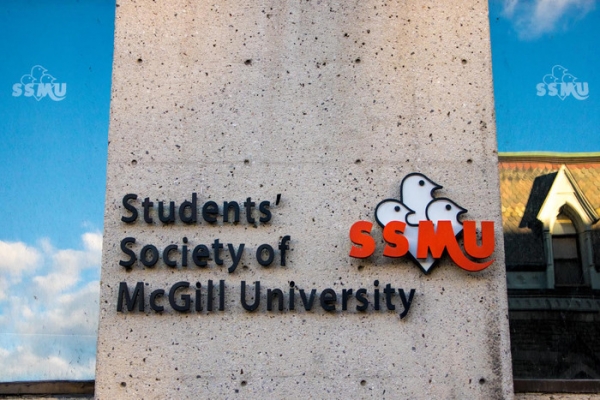STUDENTS’ SOCIETY OF MCGILL UNIVERSITY (SSMU)
The governing body for undergraduate and professional students.
What They Do
SSMU’s mandate includes supervising undergraduate clubs and extracurricular activities, managing and ensuring the sustainability of Gerts and other long-term operations, advocating for student interests in the Senate, and planning social events such as Frosh. SSMU’s policies are decided by the Legislative Council, for which the executives sit with 30 councillors who represent both faculties and extracurricular clubs. Any councillor can propose a motion, which is then voted on at Council and may become legislation. Additionally, several of the 30 councillors deliberate McGill policies at the McGill Senate. The Judicial Board, which ensures that SSMU adheres to its constitution, is comprised of seven students, predominantly from the Faculty of Law. Undergraduate students can directly influence SSMU by attending its General Assemblies and voting in online Referenda, both of which are held once every semester. Referenda and elections use easily-accessible online voting.
Recent Events
Last year, SSMU held a press conference to discuss the open letter drafted to McGill administration regarding sexual violence on campus. The open letter accused the McGill administration of failing to students from faculty-initiated violence, and it received ample attention from university groups.
POSTGRADUATE STUDENTS’ SOCIETY (PGSS)
The governing body for graduate students and postdoctoral fellows
What They Do
PGSS representatives speak on behalf of postgraduates, meeting once a month to debate and vote on policies. Additionally, it liaises with other governing bodies at McGill and beyond. Part of PGSS’ mandate is to provide an accessible social environment and improve the quality of student life for postgraduate students. In doing so, the executive plans events for students, including cocktail parties, meditation hours, and workshops, most of which take place at the Thomson House, its headquarters.
Recent Events
In March 2018, PGSS held a meeting to discuss an accessibility audit of Thomson House, which evaluated the accessibility of the building and identified ways to improve it. They also discussed amending the roles, duties, and pay of PGSS Commissioners, which was “necessary to accommodate the commissioners’ expanding portfolios and to provide them with sufficient support to achieve their goals.”
BOARD OF GOVERNORS (BOG)
McGill University’s governing body.
What They Do:
The BoG serves as the final authority over all of the university’s academic and financial affairs, and it is responsible for the maintenance of daily activities at McGill. The BoG is comprised of eight standing committees including the Finance Committee and the Committee to Advise on Matters of Social Responsibility (CAMSR). The BoG is scheduled to meet five times this upcoming school year. BoG meetings involve a private portion followed by a public session open to members of the university.
Recent Events
The Open Forum on Sustainability, held in September 2016, addressed student concerns over the campus’ carbon footprint after the BoG’s vote against divesting from fossil fuel companies. The BoG held a closed session on May 25 last year, during which they voted to reappoint Principal and Vice-Chancellor Suzanne Fortier for a second five-year term, which began on July 1, 2018. Additionally, the BoG addressed the allegations of anti-semitism at SSMU’s General Assembly, concluding that the allegations were unfounded but understandable due to campus debate surrounding the Israel-Palestine conflict.
SENATE
The university’s governing body for academic policies.
What They Do
The Senate is mandated to govern academic policies such as the development of curricula and requirements for degrees and diplomas. Additionally, it takes on a broader role at McGill, including managing the university’s libraries and administering Student Services. The Senate is comprised of nine standing committees, which include the Senate Steering Committee and the Committee on Libraries. The Senate meets on a monthly basis, during which standing committees deliver reports and senators vote on policies and nominations.
Recent Events
This past March, the Senate discussed academic integrity at McGill, specifically plagiarism-detection software on the basis of privacy in a scholastic environment. They also addressed the issue of distractions during lectures due to the presence of laptops and other electronic devices and debated the merits of encouraging discussion in the classroom as a means to combat the problem.









